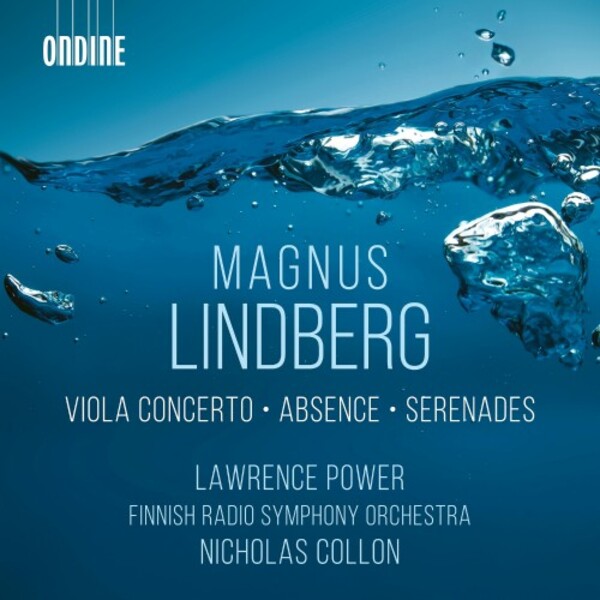LINDBERG Viola Concerto. Absence. Serenades
View record and artist detailsRecord and Artist Details
Genre:
Orchestral
Label: Ondine
Magazine Review Date: AW2024
Media Format: CD or Download
Media Runtime: 62
Mastering:
DDD
Catalogue Number: ODE1436-2

Tracks:
| Composition | Artist Credit |
|---|---|
| Concerto for Viola and Orchestra, "Steppenwolf" |
Christian Lindberg, Composer
Finnish Radio Symphony Orchestra Lawrence Power, Viola Nicholas Collon, Conductor |
| Absence |
Magnus Lindberg, Composer
Finnish Radio Symphony Orchestra Nicholas Collon, Conductor |
| Serenades |
Magnus Lindberg, Composer
Finnish Radio Symphony Orchestra Nicholas Collon, Conductor |
Author: Arnold Whittall
Now in his 60s, Magnus Lindberg is a prolific and resourceful contributor to spectral music, where ‘spectral’ has little or nothing to do with ghostly or intimidating effects but celebrates the systems and strategies that become available when particular modes of pitch and rhythm govern the composer’s chosen materials. The works on this new album are all very recent, and while it is easy enough to detect certain similarities in all three, there is an obvious and fruitful contrast to be heard between a concerto in which the soloist engages at length as both antagonist and collaborator with the collective community that is the classically sized orchestra, and the two shorter, purely orchestral compositions that interrogate the unanimity as well as diversity of which even a relatively small orchestra is capable.
Absence and Serenades were both completed in 2020, and the title of Absence is a neat, wry allusion to the presence of Beethovenian material drawn from the Les adieux Piano Sonata and closely associated with ideas of departure and farewell. Beethoven’s own presence in absence is signalled by other allusions, too, and although Lindberg shuns the kind of fiercely traumatic confrontation with the Beethoven farewell motif that electrifies Ligeti’s ultra-expressionistic Horn Trio, Absence conveys a residual unease about the challenges facing contemporary composers who seek to succeed while avoiding all explicit models and allusions. Serenades has its stratum of unease, too. In the booklet Lindberg describes the piece as ‘wild’, and as annotator Kimmo Korhonen implies, its character requires scepticism about the conventional, romantic qualities of the genre – a serenade from the shadows, indeed.
As his extensive worklist shows, Lindberg is far from sceptical about the value of the concerto as a genre, and in his Viola Concerto, completed and premiered earlier this year, the soloist’s ebullient initial response to the orchestra’s brief, almost brash, brassy challenge to action sets a large-scale, half-hour drama in motion. Maybe the early stages of this complex three-movement design risk seeming effortful in their determined flamboyance. But the emergence of broader, more lyrical material, and also of more positively angst-free exuberance, ultimately justifies the scale and sustained density of the whole. Lawrence Power’s delight in the generously proportioned starring role provided for him by the composer is never in doubt, and the skill with which conductor Nicholas Collon ensures that the orchestra never becomes a mere also-ran, even after the improvisatory, cadenza-like spotlighting given to the viola in the multi-part second movement, is the more vivid for the sonorous detailing of the recorded sound, a strong feature in all three compositions.
Discover the world's largest classical music catalogue with Presto Music.

Gramophone Digital Club
- Digital Edition
- Digital Archive
- Reviews Database
- Full website access
From £8.75 / month
Subscribe
Gramophone Full Club
- Print Edition
- Digital Edition
- Digital Archive
- Reviews Database
- Full website access
From £11.00 / month
Subscribe
If you are a library, university or other organisation that would be interested in an institutional subscription to Gramophone please click here for further information.




